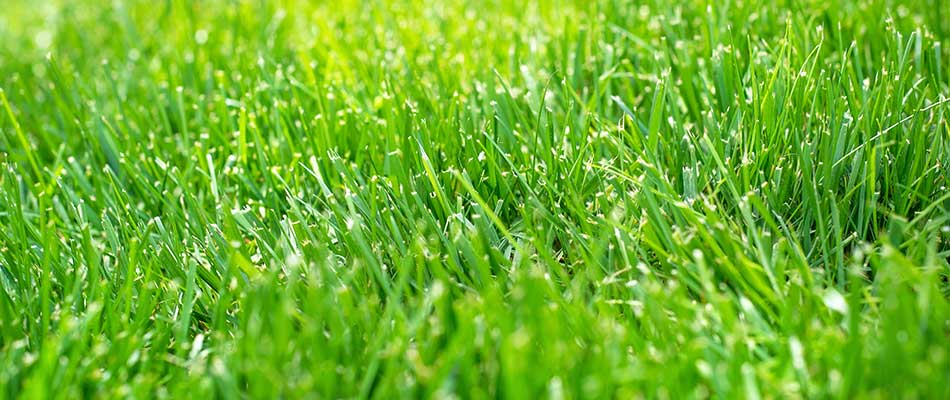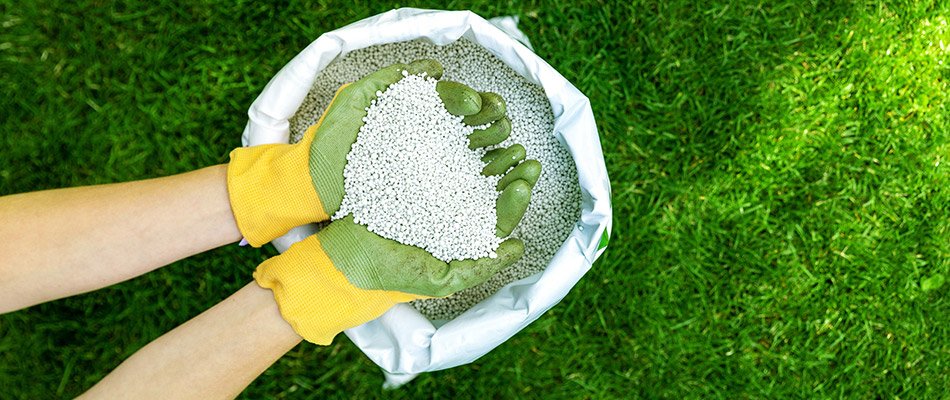We've all heard of lawn fertilizer and know that it helps replenish the nutrients in our lawns, but do you know what it is actually made up of? Every fertilizer has three key nutrients: nitrogen, phosphorus, and potassium. Each one offers different benefits to your grass no matter what type of grass seed your lawn has.
Before fertilization, it is important to understand what each type of nutrient does and how too much of these nutrients could actually cause future damage. Continue reading to learn everything you need to know about nitrogen, phosphorus, and potassium to ensure that your grass is getting the best care possible.
Nitrogen helps your lawn grow fuller, thicker, and greener.
Lawns that have the correct amount of nitrogen will grow healthy, green grass. Nitrogen is one of the most important aspects of grass growth because it encourages the production of chlorophyll, which helps grass produce energy and feed itself. Nitrogen will also help your lawn grow fuller by increasing the blade density and thickness. Some signs your lawn is in need of a nitrogen boost include yellowish grass, slow growth, and low density.

Although nitrogen is an extremely important aspect of your grass's health and growth, there can also be too much of a good thing. Too much nitrogen might "burn" your grass, which will produce spots or streaks of brown grass throughout your lawn. An over-application of nitrogen can happen easily with fast-release fertilization products.
Phosphorus will promote strong root growth and early development.
Phosphorus is essential for root growth and early development. Without it, the slightest form of erosion will wash your grass away because its roots were not anchored down with enough strength. Phosphorus also supports the energy transfer in your grass, aiding nitrogen in growth encouragement. This essential nutrient is prominent in starter fertilizers to give the grass seeds the boost they need to begin developing strong roots.
Before adding phosphorus to your lawn, though, you must understand the harm that too much of it could do. An excess amount of phosphorus will hinder your grass's ability to take up required micronutrients like iron and zinc, causing your blades to turn yellow and possibly die. Too much phosphorus is also an environmental problem because it will wash away in soil runoffs, reach nearby lakes and streams, and create a harmful amount of algae and weeds.
Potassium gives your grass the strength it needs to fight off stress, drought, and disease.
Potassium helps cool-season grass survive weather changes, such as the frigid cold winter air and the blazing hot sun. Its main benefit is that it aids your grass in fighting off drought, stress, and disease. Potassium is known for keeping your grass generally healthy and stress-free. You will find that it is the main ingredient in winterizer treatments because it prepares your grass to withstand the cold weather ahead. Signs that your lawn is in need of more potassium include wilted and yellowing blades.
Just like nitrogen and phosphorus, there is always a possibility of over-applying potassium to your lawn. Too much potassium does not directly harm the health of your lawn, however, it will affect the way that your soil absorbs other nutrients. Therefore, too much potassium will lead to the deficiency signs of nitrogen and phosphorus.
Worried about adding too much or too little nutrients? Let us help.
It can be nerve-wracking choosing the right amount of each nutrient for your lawn, knowing that too much or too little will cause more harm than good. That is why it is so important to call in the professionals before you do anything that might demand more time, attention, and money down the road.
At Grow Pros Lawn Care, LLC, we have been fertilizing lawns in the Elkhart, Granger, and South Bend, Indiana area since 2012. You can rest easy knowing that we have the experience and training to know exactly what your lawn needs. Give us a call today at (574) 326-3526 to receive a quote for your lawn fertilization application.



Comments (0)
Thanks for your comment!
Thanks for your feedback! Your comments have been successfully submitted! Please note, all comments require admin approval prior to display.
Error submitting comment!
There is a problem with your comment, please see below and try again.